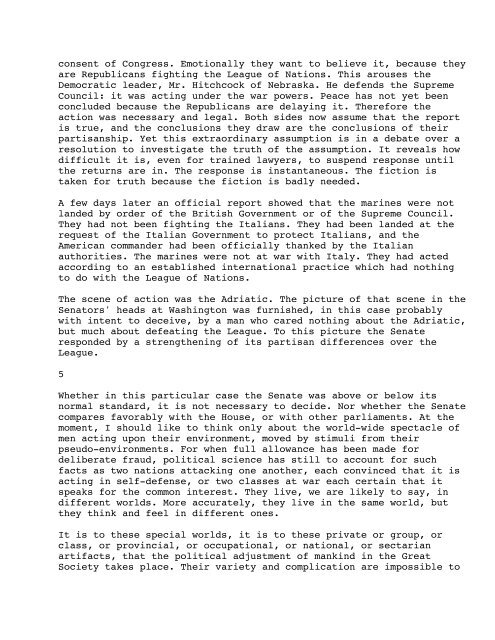PUBLIC OPINION by WALTER LIPPMANN TO FAYE LIPPMANN ...
PUBLIC OPINION by WALTER LIPPMANN TO FAYE LIPPMANN ...
PUBLIC OPINION by WALTER LIPPMANN TO FAYE LIPPMANN ...
You also want an ePaper? Increase the reach of your titles
YUMPU automatically turns print PDFs into web optimized ePapers that Google loves.
consent of Congress. Emotionally they want to believe it, because they<br />
are Republicans fighting the League of Nations. This arouses the<br />
Democratic leader, Mr. Hitchcock of Nebraska. He defends the Supreme<br />
Council: it was acting under the war powers. Peace has not yet been<br />
concluded because the Republicans are delaying it. Therefore the<br />
action was necessary and legal. Both sides now assume that the report<br />
is true, and the conclusions they draw are the conclusions of their<br />
partisanship. Yet this extraordinary assumption is in a debate over a<br />
resolution to investigate the truth of the assumption. It reveals how<br />
difficult it is, even for trained lawyers, to suspend response until<br />
the returns are in. The response is instantaneous. The fiction is<br />
taken for truth because the fiction is badly needed.<br />
A few days later an official report showed that the marines were not<br />
landed <strong>by</strong> order of the British Government or of the Supreme Council.<br />
They had not been fighting the Italians. They had been landed at the<br />
request of the Italian Government to protect Italians, and the<br />
American commander had been officially thanked <strong>by</strong> the Italian<br />
authorities. The marines were not at war with Italy. They had acted<br />
according to an established international practice which had nothing<br />
to do with the League of Nations.<br />
The scene of action was the Adriatic. The picture of that scene in the<br />
Senators' heads at Washington was furnished, in this case probably<br />
with intent to deceive, <strong>by</strong> a man who cared nothing about the Adriatic,<br />
but much about defeating the League. To this picture the Senate<br />
responded <strong>by</strong> a strengthening of its partisan differences over the<br />
League.<br />
5<br />
Whether in this particular case the Senate was above or below its<br />
normal standard, it is not necessary to decide. Nor whether the Senate<br />
compares favorably with the House, or with other parliaments. At the<br />
moment, I should like to think only about the world-wide spectacle of<br />
men acting upon their environment, moved <strong>by</strong> stimuli from their<br />
pseudo-environments. For when full allowance has been made for<br />
deliberate fraud, political science has still to account for such<br />
facts as two nations attacking one another, each convinced that it is<br />
acting in self-defense, or two classes at war each certain that it<br />
speaks for the common interest. They live, we are likely to say, in<br />
different worlds. More accurately, they live in the same world, but<br />
they think and feel in different ones.<br />
It is to these special worlds, it is to these private or group, or<br />
class, or provincial, or occupational, or national, or sectarian<br />
artifacts, that the political adjustment of mankind in the Great<br />
Society takes place. Their variety and complication are impossible to





